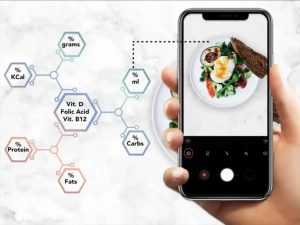Precision Nutrition — Steering India towards a Healthy Lifestyle

Have you ever wondered why two people who are eating the same diet and living a similar lifestyle have different impacts on their body? How different foods affect your weight, skin and even sleep?
Every individual’s body reacts to the same food differently. The food that we consume has an impact on our nutritional blood biomarkers — indicators of the nutritional status of our body with respect to change in our dietary intake and lifestyle. The biomarkers are for our body, as balance sheets are for a company. Studies have identified 30–60 biomarkers such as haemoglobin, blood sugar, certain vitamins, cortisol, thyroid markers that give a comprehensive idea of the nutritional status of a person’s body. They help us understand the internal requirements of our body and identify the underlying causes for weight gain, insomnia, skin and hair problems, digestion and gastrointestinal disorder, lifestyle hormonal imbalance and prevalence of unknown lifestyle diseases. Just like financial ratios, the nutritional biomarkers cannot be looked at in silos. A combination of different readings of these can give a very precise and body specific analysis.
There has been a rise in lifestyle diseases such as diabetes, obesity, PCOS (Polycystic Ovarian Syndrome) and hypertension, specifically in urban Indians due to a sedentary lifestyle, improper nutritional intake and high risk behaviors. A study by the National Institute of Nutrition states that 62% of the urban Indian population has a micronutrient deficiency in their bodies. Even though plentiful nutritionists are practicing offline, awareness towards wellness and healthy diets has not been accepted as a practice on a larger scale. People who tend to visit nutritionists are either fitness enthusiasts or patients suffering from chronic illnesses. Besides, studies have shown that weight loss programs currently run do not have sustainable results. In some cases, the lost weight is regained within a span of 2–5 years! Nutrition programs at present focus more on numbers such calorie counts, BMI or breaking down calorie intake and food portions instead of studying the components of food and how it affects an individual internally.
Sova Health, a digital wellness platform, uses a biotech/scientific approach in blood-biomarker based diagnostics. It analyses the implications of lifestyle indicators on an individual’s health conditions. The platform focuses on how specific nutrition biomarkers affect a person’s body and what foods impact them and can help improve them. Based on this, the platform generates AI-based nutrition and lifestyle recommendation plans tailored to each individual’s health profile/goals. Data points from a person’s daily habits (activities, sleep, exercise), meals are collected and mapped along with their blood biomarkers. This helps address root causes such as cholesterol, hypertension, PCOS, IBS (Irritable Bowel Syndrome), insomnia, lifestyle related hormonal imbalances and blood glucose that actually lead to problems like diabetes, obesity, fatty liver, hair loss, acne and cardiovascular diseases. Not only this, the platform helps manage lifestyle conditions by providing detailed insights into which biomarkers are at risk and how that can affect you. It also suggests locally available superfoods that you should consume to improve your biomarker condition. Eventually, Sova plans to become a personalized food whizz by integrating with food delivery platforms and online grocery platforms to provide menu and grocery list recommendations for each user. What once used to be a one size fits all approach, is now being converted into a tailor-made scientific methodology that not only looks at external factors but also pays weightage to how it affects a person internally.
IIMA Ventures has invested in the Seed round for Sova Health. The company is founded by 3 young individuals who make up a passionate and coachable team with diverse experience and expertise in business development, product & tech and domain knowledge. Tanveer has been a national level tennis player for over 10 years of his life. During this time, he realized the importance of nutrition and how it is an overlooked conversation in Indian households. He met Max, who is a cancer genomics specialist, in Germany in a Design Thinking program. Rahul too has been conscious towards a healthy lifestyle and they immediately hit it off when they met at Antler’s Singapore cohort. Sova plans to build a proprietary database by mapping blood biomarkers to lifestyle habits and generate insights out of it. Presently, no such dataset exists for the Indian market. Early growth has been observed in the digital health and wellness market with a rise in health conscious individuals who are affluent, living in urban areas and are both aware and concerned about lifestyle related health issues.
The Indian youth is slowly but steadily moving towards a more sustainable living and inculcating fitness routines and nutritional meals in their lifestyle. Along with this, there has been an increase in discretionary spending capacity of a consumer. Demand for fitness wearables and apps has increased and more and more consumers are looking for healthy eating alternatives, especially post-COVID. The digital health sector has seen a substantial investor and commercial traction in the global market. Livongo, a California based recently IPO’d company uses smart devices for digital health management of chronic conditions. Similarly Thriva, a London based company provides blood test based meal plans and food recommendations using home blood testing kits and Baze, in Boston, provides personalized supplements based on your blood nutrition test using home blood testing kits. Unicorns like 23andMe and Babylon have been operating in the precision nutrition space since years but their focus has primarily been on DNA-based personalized health assessments.
Going forward, the data generated by these digital health and wellness platforms can be of great value to insurance and healthcare/fitness companies. A report by PwC states that over 50% of consumers would be prepared to provide their insurers with additional personal and lifestyle information to enable them to seek the best deal for relevant services on their behalf. The shared value model is picking up in the insurance business where insurance companies are collaborating with health and fitness sector companies to provide a reward based insurance policy and pay-as-you-go premiums to their clients. Companies track your activity levels based on which you are awarded points that affect your premium as well as provide rewards such as discounts and coupons for the partner companies. Using data available through such collaborations, insurance companies can get insights into better customer profiling and pricing for risk. Insurance companies can tailor and personalize their products and price offerings based on the customer needs. A similar model can also be carved out with companies like Curefit, which have completely changed the way people look at health and fitness.
At IIMA Ventures we continue to look for and support entrepreneurs challenging older norms & taking advantage of changing market dynamics and consumer perception that is a pivotal tipping point. We believe, the way nutrition and health is perceived is bound to change, and as newer adopters come to the market such solutions will warrant a second look.
